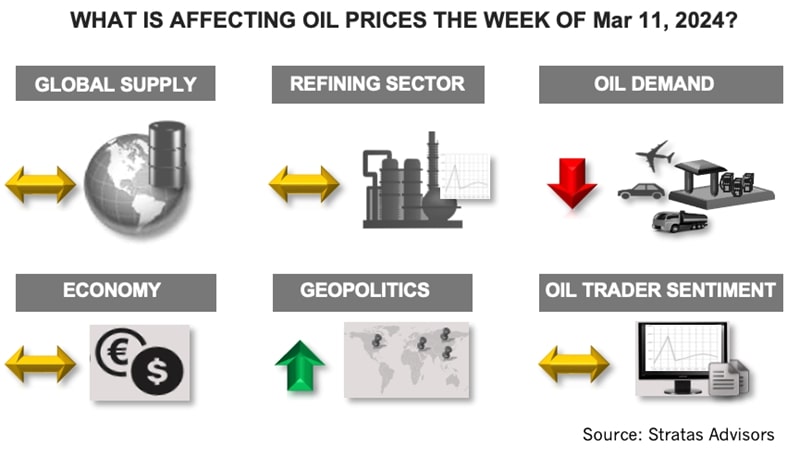The price of Brent crude ended the week at $82.08 after closing the previous week at $83.66. With the decrease of last week, the price of Brent crude moved slightly below its 200-day moving average, which the price has been hovering around since early February. The price of WTI ended the week at $77.84 after closing the previous week at $79.77. The price of DME Oman crude ended the week at $81.79 after closing the previous week at $82.93.

Oil prices decreased despite OPEC+ announcing last week that the cuts will be extended for another quarter – along with the possibility that OPEC+ will be considering extending the supply cuts through the end of the year. Saudi Arabia will be extending its voluntary crude production cut of 1 MMbbl/d until the end of the second quarter. Additionally, Russia will reduce its production and export supplies by a combined 471,000 bbl/d until the end of June.
We are expecting that oil prices will move higher in the middle of the year, but for the upcoming week, there is no impetus for prices to move higher.
- The Chinese economy continues to exhibit relatively tepid growth – and the recent announcements of last week did not offer any reason for heightened optimism, given the lack of any major stimulus plans. China issued its growth target for 2024 of “around five percent”, and a central government budget deficit of three percent of GDP with spending increasing by 3.8%. Additionally, China reiterated its focus on technological investments pertaining to electric vehicles, lithium-ion batteries, and renewable energy, including solar panels, wind turbines, and storage;
- Demand growth in 2024 has remained muted, so far, and Stratas Advisors is maintaining its forecast for global oil demand growth of 1.3 MMbbl/d in 2024;
-
- U.S. gasoline demand is running 2.9% less during the last four weeks in comparison with 2023, while diesel demand is essentially the same as in 2023, and jet fuel demand is running 1.62% more than in 2023; and
- We are forecasting that China’s demand will increase by 630,000 bbl/d during 2024, which is a growth rate of around 4.2%.
- The conflict in Ukraine and the conflict in Gaza are currently having limited impact on the oil markets.
-
- So far, the risk of escalation and expansion of the conflict in the Middle East has remained relatively low because Iran and the U.S. (and Israel) have not directly confronted each other militarily. We think this will remain the case – and the most likely outcome still includes a ceasefire arrangement. The situation, however, could become more complicated if Israel feels the need to invade Rafah in southern Gaza; and
- The conflict in Ukraine is also reaching a crossroads with Russia appearing to be gaining momentum with the Ukrainian forces struggling because of the lack of equipment and manpower. Consequently, NATO members could be facing the decision of whether to escalate, including more direct involvement, or encourage Ukraine to reach a negotiated settlement with Russia, since it appears that Russia is unlikely to be forced out of Ukraine with the current dynamics. Additionally, there is reason to believe that Russia views influence over the Black Sea as being strategically important (especially, given the encroachment of NATO along the Baltic Sea), and therefore, is likely intent on gaining control of Odessa, if the conflict continues.
For a complete forecast of refined products and prices, please refer to our Short-term Outlook.
About the Author: John E. Paisie, president of Stratas Advisors, is responsible for managing the research and consulting business worldwide. Prior to joining Stratas Advisors, Paisie was a partner with PFC Energy, a strategic consultancy based in Washington, D.C., where he led a global practice focused on helping clients (including IOCs, NOC, independent oil companies and governments) to understand the future market environment and competitive landscape, set an appropriate strategic direction and implement strategic initiatives. He worked more than eight years with IBM Consulting (formerly PriceWaterhouseCoopers, PwC Consulting) as an associate partner in the strategic change practice focused on the energy sector while residing in Houston, Singapore, Beijing and London.
Recommended Reading
Enbridge Advances Expansion of Permian’s Gray Oak Pipeline
2024-02-13 - In its fourth-quarter earnings call, Enbridge also said the Mainline pipeline system tolling agreement is awaiting regulatory approval from a Canadian regulatory agency.
Sunoco’s $7B Acquisition of NuStar Evades Further FTC Scrutiny
2024-04-09 - The waiting period under the Hart-Scott-Rodino Antitrust Improvements Act for Sunoco’s pending acquisition of NuStar Energy has expired, bringing the deal one step closer to completion.
Stockholder Groups to Sell 48.5MM of Permian Resources’ Stock
2024-03-06 - A number of private equity firms will sell about 48.5 million shares of Permian Resources Corp.’s Class A common stock valued at about $764 million.
CEO: Coterra ‘Deeply Curious’ on M&A Amid E&P Consolidation Wave
2024-02-26 - Coterra Energy has yet to get in on the large-scale M&A wave sweeping across the Lower 48—but CEO Tom Jorden said Coterra is keeping an eye on acquisition opportunities.
Riley Permian Announces Quarterly Dividend
2024-04-11 - Riley Exploration Permian’s dividend is payable May 9 to stockholders of record by April 25.





